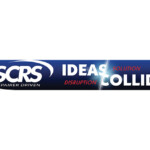Visionary Views Shine During SCRS’ Ideas Collide Showcase
by Alana Quartuccio
The Society of Collision Repair Specialists (SCRS) is known for its good ideas. Every year at SEMA, their IDEAS Collide Showcase in particular is a favorite segment in its Repairer Driven Education series.
 SCRS Executive Director Aaron Schulenburg told the audience that the 10-minute “TED Talk”-style presentations that make up the IDEAS Collide Showcase are a very special event for SCRS. “We’ve had two amazing days of education, conference and conversations on how we can go back and better our business with very real, tangible discussions. Today, we start to shift a bit; it’s about vision and ideas. It’s about how we can take a big perspective of what we can look at differently to shake things up and do more for those within the industry.”
SCRS Executive Director Aaron Schulenburg told the audience that the 10-minute “TED Talk”-style presentations that make up the IDEAS Collide Showcase are a very special event for SCRS. “We’ve had two amazing days of education, conference and conversations on how we can go back and better our business with very real, tangible discussions. Today, we start to shift a bit; it’s about vision and ideas. It’s about how we can take a big perspective of what we can look at differently to shake things up and do more for those within the industry.”
SCRS invited seven individuals to share their passion, stories and ideas with the audience.
Cole Strandberg (FOCUS Investment Banking) sees a different spin on issues like increased vehicle complexity, technician shortages and competition. “The beauty is these challenges create opportunities.” As he spoke of his belief that “The Era of the Single-Store Generalist Body Shop is Coming to an End,” he suggested shops specialize, scale or sell as ways to achieve success.
“The single store isn’t dying tomorrow, but everyone is here for a reason – to improve and grow. This is foresight into what is happening.”
Jill Tuggle, executive director of the Auto Body Association of Texas (ABAT), shared her vision for how to “Un-Divide and Conquer” by creating more community among body shops. Tuggle envisions a world where every shop gets “off their own island” and changes perceptions about negative aspects. “I want to inspire you today to be part of a culture. Let’s rise from the ashes of the fiery crash.” She strongly encourages association participation.
“The keys to success in industry is going to be community, not division,” Tuggle stressed. “Stay away from the things you see that create division, and be a part of your state association.”
Christian Ruecker (DEKRA North America) spoke about “Sustainability’s Role in Every Layer of Collision Repair” and the various ways one can make their “business more profitable, make life easier and accomplish more with less effort.”
Perhaps solar power can be used to power air conditioning, or a collision repair business could make electric vehicle charging a valuable revenue stream.
“Operate and see yourself as a CEO of your business,” proposed Bill Park (Crunchit Financial Services), whose “Peak Blue-Collar: The Evolution of Collision Repair Shops into White-Collar Enterprises” idea involves taking roots from one’s blue collar heritage and finding white-collar strategies to get off that proverbial island where one feels isolated. “Don’t lose the hustle and the grit you have. How you got here won’t get you there tomorrow.”
Jeramy Holloway (Spanesi Americas) gave strong evidence to back up the benefits of “Earning Return on Capital Spending.” Getting a return on one’s investment goes a step beyond the equipment purchasing and related training. “I can give you the information [in the training], but then you have to use it after I leave. If you shove the equipment in the corner and don’t use it, you won’t make money or you may use it improperly. So, implementation is key in getting a ROI on your equipment purchase.”
Measuring success on a piece of equipment should be based on speed, cost and quality. “Everyone screams, ‘I need training,’ and yes, you do, but you need to put it to work for you. Then you will be successful with the equipment you bought, and you will see ROI.
Wayne Weikel (Alliance of Automotive Innovation) used his 10-minute presentation to highlight “The Fine Print of REPAIR Politics.” According to Weikel, this proposed federal REPAIR Act legislation is not about proper repairs or making sure a body shop business gets paid for proper repairs. Rather, it seems to gear toward the interest of aftermarket parts and insurance companies, and “they are not repairers,” he noted.
“Has nothing been learned from the Seebachan case?” Weikel asked. “Educate and advocate. If you don’t get out there and talk to them about it, someone else will.”
Last but not least, Molly Mahoney (Collision Engineering Program) shared her message of “Building the Future Together: Uniting Education Industry and Community”, stressing that bringing young people into the industry workforce takes industry participation.
“Education isn’t about learning facts; it’s about equipping students to adapt and thrive in the world. They aren’t just learning skills, but they are learning to build a sustainable career. It’s not just going out and getting a job.”
Want more? Check out the December 2024 issue of Hammer & Dolly!
